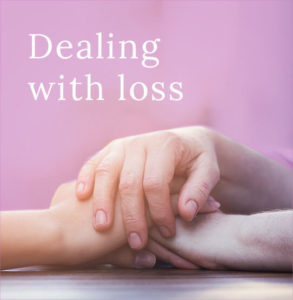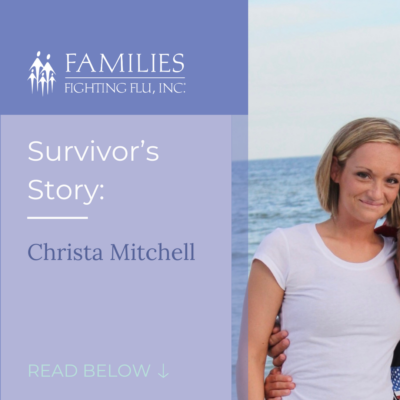
- Personal Stories
When the Holidays Aren’t Happy – How To Manage Grief and Support Others

Angie Wehrkamp’s daughter Gianna died suddenly from the flu when she was 2 years old. Angie serves as Secretary for the Families Fighting Flu Board of Directors.
The most wonderful time of the year will never be as wonderful as it once was for someone who has lost a child or other loved one. I know this firsthand. I lost my sweet 2-year-old daughter, Gianna, to the flu in 2015. While the loss of a child leaves a wound that will never heal, and the grief of losing Gianna is never gone, it has slowly become more manageable.
Learning to live with loss is a process, and one I’m still going through. One thing I know is that the sting of the pain will feel fresh again around the holidays. This year may feel especially hard, as many of us will be away from friends and family and we are all dealing with more stress and anxiety because of COVID-19.
However, there are things we can do to ease the emotional load of grief this time of year—either our own or someone else’s.
Managing Your Grief
- Allow Yourself to Feel. Grief is a process by which you heal. Feeling the pain instead of trying to avoid it can actually help you in the long-term. Rather than find ways to avoid or numb your grief, allow yourself to feel it as part of your healing process. Additionally, you may find yourself feeling guilty during happy moments at the holidays—give yourself permission to feel any and all emotions that you experience.
- Honor Your Loved One. Some people may want to continue a tradition they used to do with their loved one at the holidays, while others may find that too painful. Whatever you choose, find a special way to honor your loved one in a way that feels good to you. Perhaps you light a candle for them or serve their favorite meal. Maybe you share your favorite memories of them or look at pictures.
- Stay Active. Though the weight of grief can feel too heavy to bear at times, try to stay active to maintain a sense of structure and purpose. Following a daily routine can help, along with finding activities that you enjoy. Consider channeling your feelings into creative outlets like writing or painting, physical channels like walking or biking, or feel-good activities like volunteering and serving others.
- Connect with Others. Grief can be isolating, especially when people don’t know what to say or do. Couple that with distancing from loved ones because of COVID, and it can be easy to feel completely alone in your grief. Find people you love and trust to talk to and spend time with during this time of the year, even if it’s virtual. Consider a FaceTime call with a friend, a Zoom game night or a socially distanced walk together.
- Set Time to Recharge. Holiday gatherings may look different this year, but many are still taking place in safe and socially distanced ways. If you’re not up for attending an event, that’s OK. You don’t have to force yourself to go. And if you do go, plan mini-breaks for yourself like stepping outside, taking bathroom breaks throughout the night, or even leaving an event early.
Supporting Someone Else
- Say Something. Grief is isolating, and many people let the fear of saying or doing the wrong thing keep them from doing anything at all. For someone who is grieving, this can be especially painful. Don’t be afraid to mention to someone that you’re thinking of them during the holiday season, and that you understand it might be a hard time of year for them. You won’t be “reminding” them of their pain—they’re already living with it. A text message, phone call, or card can go a long way.
- Say Their Name. When you are talking to someone who has lost a loved one, use the name of their loved one. It means a lot to know that people remember the person you lost. I know I appreciate hearing people who loved Gianna talk about her and use her name.
- Listen. Anyone who has been through a tragedy can tell you that talking about it tends to make other people uncomfortable. But talking through an experience is also part of the healing process, so being willing to listen is a wonderful gift. You might not know what to say, and that’s OK. It’s the listening that matters. Listen with compassion and acknowledge whatever feelings they share just as they are.
- Don’t Try To “Fix” It. Many well-intentioned people make comments that they don’t intend to be hurtful when trying to make a grieving friend feel better. Instead of pointing out silver linings or everything they do have to be grateful for, just validate their feelings without trying to point out the “bright side.” Avoid comments like “it’s part of God’s plan,” “at least you got X years with them,” “they’re in a better place now,” or “look at all you have to be thankful for.”
- Honor Their Loved One. If you are a close friend or family member, finding a simple way to honor their loved one can be especially meaningful. Consider bringing them flowers in their loved one’s memory, giving them an ornament to honor their loved one, or simply sharing your favorite memory with that person.
- Offer Specific Support. Without knowing what to do, you may be tempted to say something like, “Let me know what I can do.” This puts the burden on the grieving person to ask for help. Instead, take the initiative, think of a tangible way to offer support and then do that for them. Drop a little gift by their house or pick up some of their favorite treats. Bring them a meal or mail them a care package. Whatever you decide, don’t be surprised if they aren’t up for small talk on the phone or at the front door. Take that burden off of your loved one by dropping something at the door and then texting them to let them know.
For more resources on Grief and Emotional support, click here.


